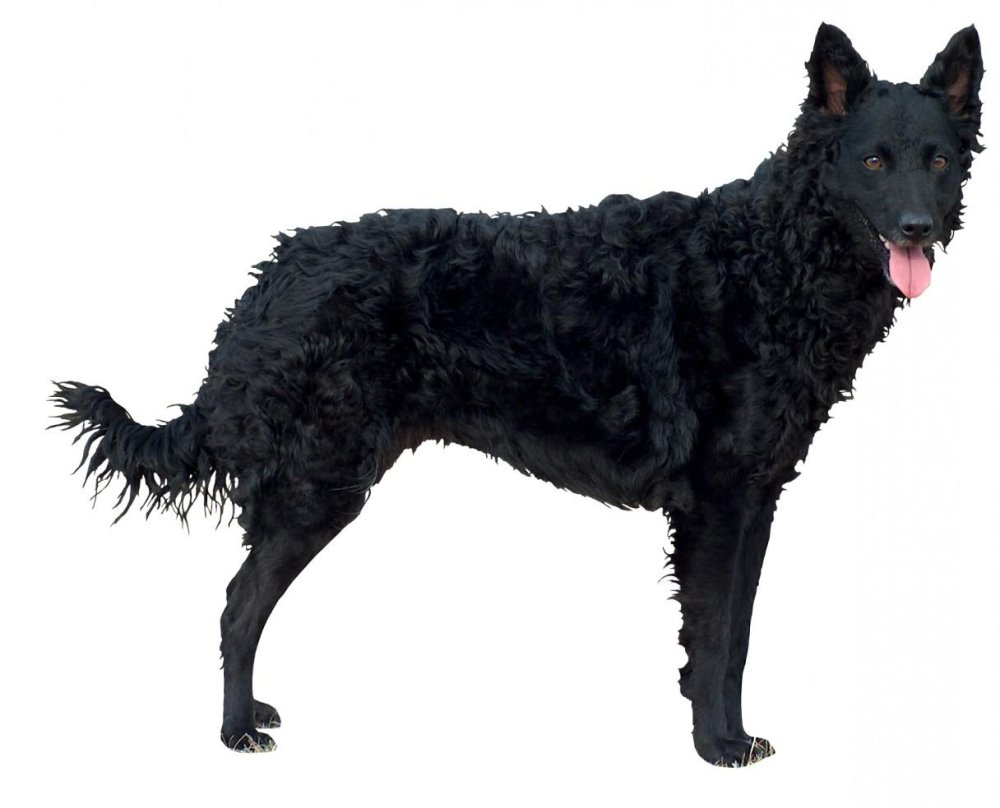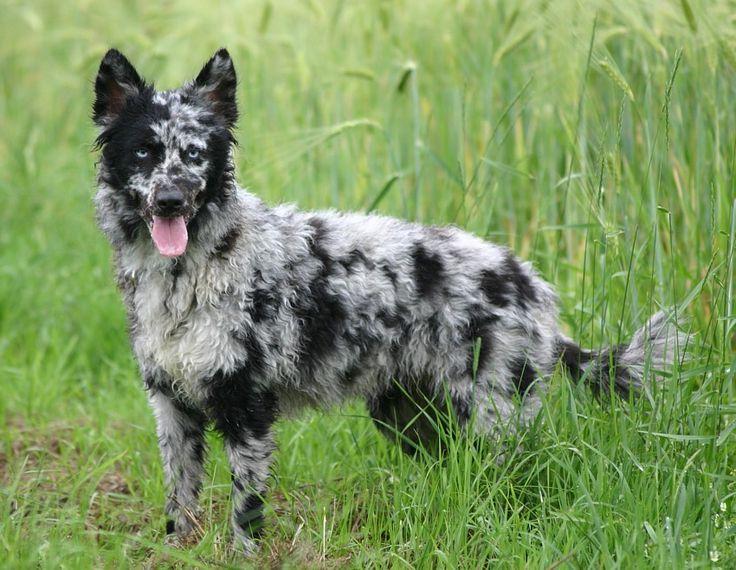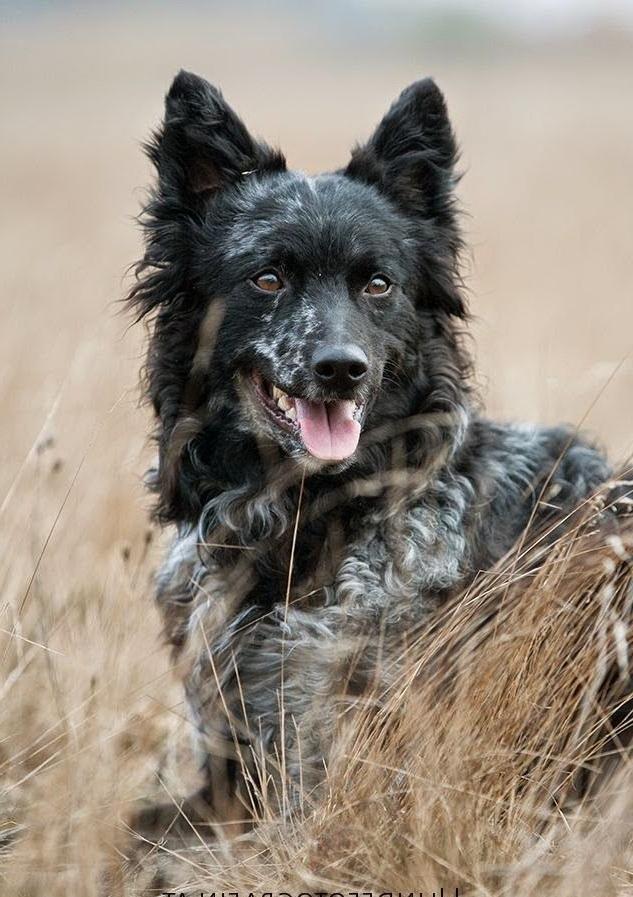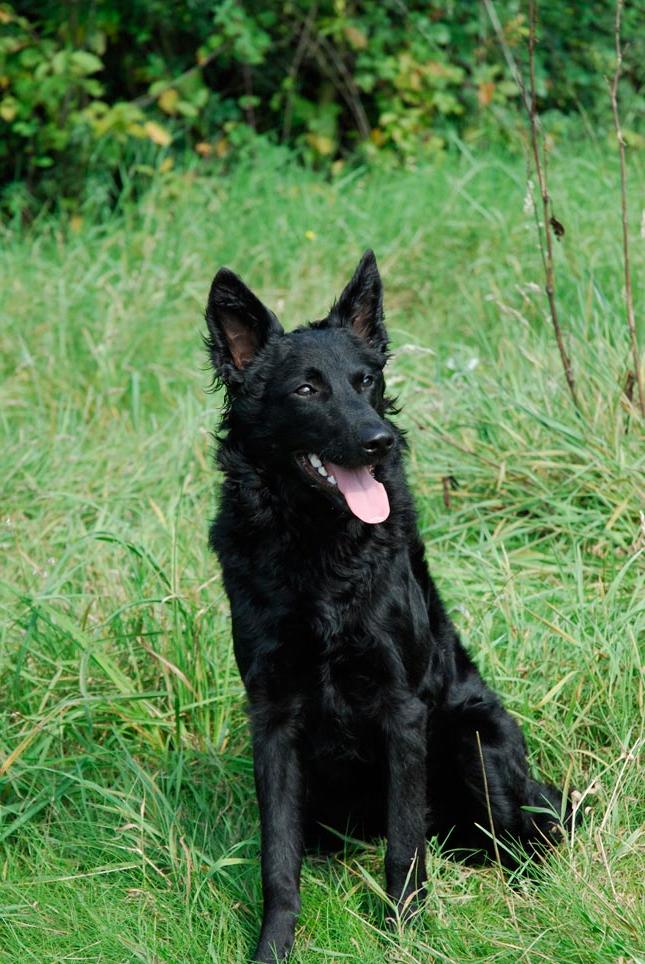- Breed Category: Herding
- Country of Origin: Hungary
- Average Height: Males 41-47 cm, Females 38-44 cm
- Average Weight: Males 11-13 kg, Females 8-11 kg
- Average Life Span: 12-14 years
- Grooming Requirements: Moderate, regular brushing needed
- Exercise Requirements: High, needs daily exercise
- Coat Type: Wavy or curly
- Coat Color Variations: Black, brown, white, grey, merle
- Shedding Level: Moderate
- Ear Type: Erect
- Tail Type: Curled over back
- Temperament: Energetic, intelligent, loyal
- Intelligence Level: High
- Barking Tendency: Moderate to high
- Compatibility with Children: Good with proper socialisation
- Compatibility with Other Pets: Generally good
- Training Ease: Easy, eager to learn
- Common Health Issues: Hip dysplasia, epilepsy
- Dietary Needs: High-quality dog food recommended
- Energy Level: Very high
- Drooling Tendency: Low
- Sensitivity to Weather: Moderate, prefers mild climates
- Overall Maintenance Level: Moderate
- Original Purpose: Herding livestock
- Year of Recognition by Kennel Clubs: 2006 by FCI
- Apartment Friendly: Not ideal, needs space
- Best Suited For: Active families, rural settings
- Cost of Ownership: Moderate
- Unique Traits: Versatile working dog, rare breed
Think all herding dogs are the same? Let me introduce you to the Mudi, a breed that stands out with its unique charm and versatility. Originating from Hungary, the Mudi is a medium-sized herding dog known for its intelligence and agility. This breed has a rich history, dating back to the 19th century, when it was developed to herd sheep and cattle. Its keen instincts and adaptability made it a favourite among farmers.
The purpose of this article is to delve into the Mudi’s fascinating characteristics, explore its historical roots, and provide insights into its care. Whether you’re considering adding a Mudi to your family or simply curious about this remarkable breed, you’ll find valuable information here.
The Mudi: A Unique Herding Companion

Early Development of the Breed
The Mudi’s journey began in the 19th century, right in the heart of Hungary. It wasn’t just a random mix; this breed was carefully developed by combining local herding dogs with other European breeds. The goal was to create a dog that could handle the diverse challenges of Hungarian farming life. And they nailed it. The Mudi quickly became a reliable partner for farmers, thanks to its sharp instincts and versatility.
Role in Hungarian Herding and Farming
In the fields of Hungary, the Mudi was more than just a herder. It was a vital part of the farming community. With its agility and intelligence, the Mudi excelled at managing livestock, whether it was sheep, cattle, or even pigs. Farmers relied on its ability to adapt to different tasks, making it an indispensable asset in agricultural life.
Key Historical Figures in Breed Recognition
One of the pivotal figures in the Mudi’s recognition was Dr. Dezső Fényes, a Hungarian veterinarian. His efforts in the early 20th century were crucial in distinguishing the Mudi as a separate breed. Thanks to his dedication, the Mudi gained official recognition, ensuring its preservation and continued development.
Physical Characteristics
The Mudi is a medium-sized dog, typically weighing between 8 to 13 kilograms. Its coat is a standout feature, with a wavy or curly texture that comes in a variety of colours, including black, white, and merle. The Mudi’s ears are upright and alert, giving it an expressive and intelligent look. This breed is built for agility, with a lean, muscular body that supports its active lifestyle.
Appearance and Unique Traits

Distinctive Features
The Mudi is a medium-sized dog, typically weighing between 8 to 13 kilograms. Its coat is a standout feature, with a wavy or curly texture that comes in a variety of colours, including black, white, and merle. The Mudi’s ears are upright and alert, giving it an expressive and intelligent look. This breed is built for agility, with a lean, muscular body that supports its active lifestyle.
Unique Physical Traits
One of the Mudi’s most striking features is its curly coat, which not only adds to its charm but also provides protection against the elements. The erect ears are another distinctive trait, always on the lookout, reflecting the breed’s alert nature. These physical characteristics make the Mudi not just a pretty face but a practical companion for outdoor activities.
Temperament and Behaviour
When it comes to temperament, the Mudi is known for its intelligence and eagerness to please. This makes training a breeze, as they quickly pick up commands and tasks. They’re energetic and thrive on mental and physical stimulation, making them perfect for active families or individuals. Despite their working dog roots, Mudis are also affectionate and form strong bonds with their human companions.
Personality and Suitability

Typical Personality Traits
The Mudi is a loyal and intelligent breed, known for its agility and quick thinking. These dogs are eager to learn and thrive on challenges, making them excellent companions for those who enjoy an active lifestyle. Their loyalty is unmatched, and they form strong bonds with their families, always ready to protect and please.
Suitability as a Family Pet and Working Dog
As a family pet, the Mudi is a fantastic choice. They are adaptable and can fit into various family dynamics, whether in a bustling household or a quieter environment. Their herding instincts make them excellent working dogs, capable of handling livestock with ease. This dual capability makes them versatile companions, both at home and in the field.
Interaction with Children and Other Animals
Mudis are generally good with children, displaying patience and playfulness. They can be protective, ensuring the safety of younger family members. When it comes to other animals, early socialisation is key. With proper introduction, they can coexist peacefully with other pets, although their herding instincts might occasionally kick in.
Training and Exercise Needs
Training a Mudi is usually straightforward due to their intelligence and eagerness to learn. They respond well to positive reinforcement and enjoy tasks that challenge their minds. Regular exercise is essential to keep them happy and healthy. Long walks, play sessions, and mental stimulation are all part of a Mudi’s ideal routine.
Training, Exercise, and Health of the Mudi

Importance of Early Training and Socialisation
Getting a Mudi off to a good start with early training and socialisation is crucial. These dogs are naturally intelligent and eager to learn, so introducing them to various environments, people, and other animals early on helps them grow into well-rounded adults. This foundation is key to managing their herding instincts and ensuring they adapt well to family life.
Recommended Training Techniques
Positive reinforcement is the way to go with Mudis. They respond brilliantly to rewards and praise, making training sessions enjoyable for both you and your dog. Consistency is important, so regular short sessions work best. Incorporating games and challenges keeps them engaged and mentally stimulated.
Daily Exercise Requirements and Activities They Enjoy
Mudis are active dogs that need plenty of exercise to stay happy. Daily walks, playtime, and activities like agility or obedience training are perfect for them. They love tasks that challenge their minds and bodies, so mix it up to keep them entertained.
Health and Lifespan
Generally healthy, Mudis have a lifespan of around 12 to 14 years. Regular vet check-ups, a balanced diet, and plenty of exercise contribute to their well-being. Like any breed, they can be prone to certain genetic conditions, so responsible breeding and health screenings are important.
Health and Care of the Mudi

Common Health Issues
Mudis are generally healthy, but like any breed, they can be prone to certain health issues. Hip dysplasia and epilepsy are among the more common concerns. Regular vet check-ups are essential to catch any potential problems early.
Average Lifespan and Health Tips
The Mudi typically enjoys a lifespan of 12 to 14 years. To keep them healthy, ensure they have a balanced diet, regular exercise, and mental stimulation. Keeping their weight in check is crucial, as obesity can lead to other health issues.
Preventative Care Recommendations
Preventative care is key to a Mudi’s long-term health. Regular vaccinations, flea and tick prevention, and dental care should be part of their routine. Annual health screenings can help detect any genetic conditions early.
Grooming and Maintenance
The Mudi’s curly coat requires regular grooming to prevent matting. A good brush once or twice a week should suffice. They don’t shed excessively, but during shedding season, more frequent brushing might be needed. Regular ear checks and nail trims are also important to keep them in top shape.
Coat Care and Grooming for the Mudi

Coat Care and Grooming Routines
The Mudi’s coat is one of its most distinctive features, with its wavy or curly texture. Regular grooming is essential to keep it looking its best. A good brush once or twice a week helps prevent matting and keeps the coat healthy. It’s not just about aesthetics; regular grooming also helps distribute natural oils, keeping the skin healthy.
Shedding and Seasonal Grooming Tips
While Mudis don’t shed excessively, they do have seasonal shedding periods. During these times, more frequent brushing is beneficial to manage loose hair and keep your home tidy. A slicker brush or a comb designed for curly coats can be particularly effective. Regular grooming during shedding seasons also helps reduce the risk of matting.
Diet and Nutrition
A balanced diet is crucial for the Mudi’s overall health and well-being. High-quality dog food that meets their nutritional needs is essential. Look for options rich in protein and healthy fats to support their active lifestyle. Fresh water should always be available, and treats should be given in moderation to prevent weight gain. Regular vet consultations can help tailor a diet plan that suits your Mudi’s specific needs.
Nutritional Needs and Feeding for the Mudi

Nutritional Needs for Optimal Health
For a Mudi to thrive, a balanced diet is key. These active dogs need high-quality food rich in protein to support their muscles and energy levels. Healthy fats are also important for maintaining their coat and overall health. Look for dog food that includes essential vitamins and minerals to keep them in top shape.
Foods to Include and Avoid
Include lean meats, fish, and vegetables in their diet. These provide the necessary nutrients without unnecessary fillers. Avoid foods high in artificial additives, sugars, and excessive grains, as these can lead to health issues. Always ensure fresh water is available.
Feeding Schedules and Portion Recommendations
Feeding your Mudi twice a day is generally recommended. This helps maintain their energy levels throughout the day. Portion sizes depend on their age, weight, and activity level, so it’s best to consult with your vet for tailored advice. Avoid overfeeding to prevent obesity.
Fun Facts and Trivia
Did you know the Mudi is known for its unique ability to herd not just sheep but also pigs? This versatility is a testament to their intelligence and adaptability. Another fun fact: the Mudi’s curly coat is not just for looks; it provides protection against harsh weather, making them perfect for outdoor adventures.
Fascinating Tidbits and Famous Mudis
Interesting Tidbits about the Mudi
The Mudi is a breed full of surprises. Not only are they adept at herding sheep, but they also have a knack for managing pigs, showcasing their versatility and intelligence. Their curly coat isn’t just for show; it provides excellent protection against harsh weather, making them ideal for outdoor activities. Despite their working dog roots, Mudis are known for their agility in dog sports, excelling in agility trials and obedience competitions.
Famous Mudis in Media and History
While the Mudi might not be as famous as some other breeds, it has made its mark in history and media. In Hungary, the Mudi is celebrated as a national treasure, often featured in cultural events and exhibitions. One notable Mudi, named “Fickó,” gained fame for his exceptional herding skills, becoming a symbol of the breed’s capabilities. Although not a common sight in movies or TV, the Mudi’s unique appearance and talents make it a standout when it does appear.
Final Thoughts

The Mudi is a remarkable blend of intelligence and versatility. This Hungarian herding breed excels both as a working dog and a family companion. With its energetic nature and keen instincts, the Mudi offers a rewarding experience for those who embrace its active lifestyle. Whether herding livestock or engaging in dog sports, the Mudi’s adaptability and loyalty shine through. Consider welcoming a Mudi into your life and discover the joy of this unique and dynamic breed.
